must 的三种反义疑问句教案资料
简易版反义疑问句讲解PPT课件
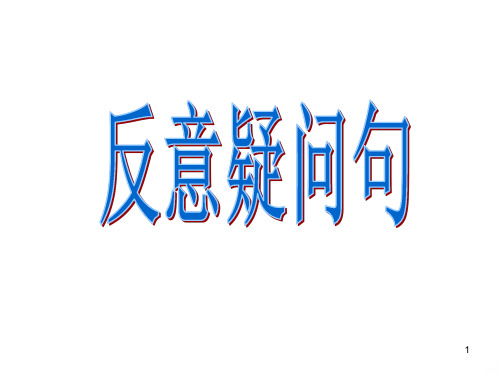
(2) 祈使句的否定形式,其反意问句通常只用 will you构成。 e.g. Don’t smoke in the meeting room, will you?
She must be a student, isn’t she?
(3) 陈述句的谓语部分是“must have + 过去分
词”时,如果这个结构带有一个表示过去
的时间状语,则反意疑问句部分用did作助
动词;如果没有表示过去的时间状语,则
反意疑问句部分用have作助动词。如:
They must have finished their work
1
反意疑问句又可叫做附加疑问句,由“陈述 句+反意问句”构成。 反意问句的动词总是助动词、情态动词或be 动词的某种形式,反意问句的主语用代词充 当。基本原则是“前否后肯,前肯后否”。
2
1. 陈述部分含有must的反意疑问句
(1) 陈述句部分谓语动词含有must时,must
如表示“必须”,反意问句用needn’t;
如
mustn’t表示“禁止”,其反意问句部分
用
must。
e.g. You must get to school at 8 a .m., needn’t
you?
You mustn't smoke here, must you?
3
(2) “must + be”表示“推测”时,反意疑问句
部分用be的适当形式。如:
9
6. 陈述部分谓语动词have作“有”解时,可 用don’t或haven’t反问;作其他意义解释 时用do的某种形式反问。
e.g. He hasn't any sisters, does/has he? They have to receive strict training beforehand, don't they?
must的反义疑问句用法及回答
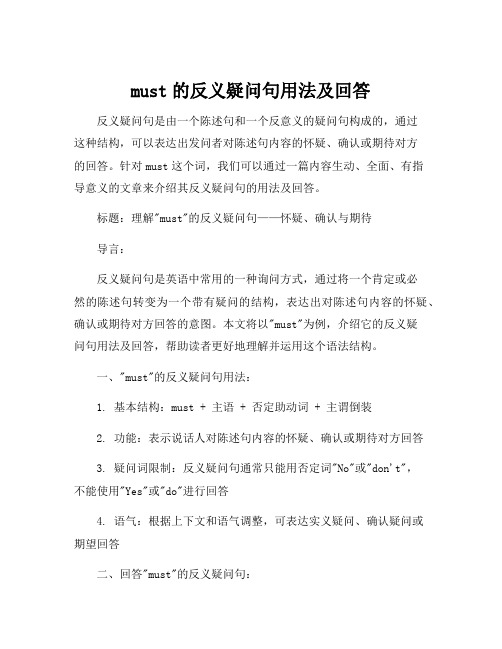
must的反义疑问句用法及回答反义疑问句是由一个陈述句和一个反意义的疑问句构成的,通过这种结构,可以表达出发问者对陈述句内容的怀疑、确认或期待对方的回答。
针对must这个词,我们可以通过一篇内容生动、全面、有指导意义的文章来介绍其反义疑问句的用法及回答。
标题:理解"must"的反义疑问句——怀疑、确认与期待导言:反义疑问句是英语中常用的一种询问方式,通过将一个肯定或必然的陈述句转变为一个带有疑问的结构,表达出对陈述句内容的怀疑、确认或期待对方回答的意图。
本文将以"must"为例,介绍它的反义疑问句用法及回答,帮助读者更好地理解并运用这个语法结构。
一、"must"的反义疑问句用法:1. 基本结构:must + 主语 + 否定助动词 + 主谓倒装2. 功能:表示说话人对陈述句内容的怀疑、确认或期待对方回答3. 疑问词限制:反义疑问句通常只能用否定词"No"或"don't",不能使用"Yes"或"do"进行回答4. 语气:根据上下文和语气调整,可表达实义疑问、确认疑问或期望回答二、回答"must"的反义疑问句:1. 实义疑问:Yes, 主语 + 肯定/否定陈述 OR No, 主语 + 肯定/否定陈述示例:A: You must be tired, aren't you?B: Yes, I am. / No, I'm not.2. 确认疑问:Yes, 主语 + 肯定/否定 OR No, 主语 + 肯定/否定示例:A: You must go to the party, don't you?B: Yes, I must. / No, I don't have to.3. 期待回答:回答时可以根据上下文和个人意愿做出选择,表达对主观或客观情况的期待示例:A: You must have enjoyed the movie, didn't you?B: Yes, I did. / No, I didn't like it that much.三、生动运用"must"的反义疑问句在日常交流中,反义疑问句可以让对话更具互动性,以下是一些常见场景:1. 对他人的行为或想法表示怀疑:A: He must be lying, isn't he?B: No, I don't think he would lie about it.2. 确认对方的观点或期待回答:A: You must be excited about the upcoming trip, aren't you?B: Yes, I can't wait to explore new places.3. 承认自己的责任或限制:A: I must apologize for my mistake, don't I?B: Yes, it would be the right thing to do.4. 判断对方的能力或技能:A: You must be good at playing the guitar, aren't you?B: No, I'm still learning and improving.结论:掌握"must"的反义疑问句的用法和回答,有助于更好地理解对方的观点、引导对话以及表达自己的态度。
must反义疑问句教学文稿

精品文档精品文档Must相关的反义疑问句反义疑问句最大最主要考点1.must have done.表示对过去某事的肯定猜测,翻译成: 准是…一定…其否定或疑问形式都用can/could来表示。
例如:since the road is wet,it must have rained last night.2;当然对现在发生或者将来发生的事情,要用must do表示猜测,否定为can’t dohe must understand that we mean business.You must be hungry after a long walk.反意疑问句中含有Must的情况主要有以下几种:1)作为情态动词表“必须”,这时反意疑问句直接用mustn'/needn't2)当must表示推测时又分以下几种情况:a:对现在事实的推测,反意疑问句与must后面的动词呼应,如:You must be joking,aren't you ?b:对过去事实的推测,表示动作的时候用did 当助动词,表示状态时用was,如:Mr Green must have been punished for his being rude at the meeting,didn‘t he ?(格林先生一定因为昨天在会上鲁莽的行为被处罚了,是吗?)被处罚表示一个动作She must have been a policeman ,wasn't she ?(她过去一定是个警察,是吗?)是警察表示一种状态对现在情况的推测,问句部分用主动词(do, be)一般现在时的适当形式。
若是现在进行时,问句部分用现在进行时的适当形式表示。
若是there be结构,问句用isn't/aren't there。
如:1)He must be there, isn't he?2)He must have a big family, doesn't he?3)He must be waiting outside, isn't he?4)There must be some students in the room, aren't there?对已发生的过去情况的推测,若陈述句谓语部分有“must have done”,而且有表示过去的时间状语,问句部分用didn't;若没有表示过去的时间状语,问句部分用haven't或hasn't。
(完整版)含有must时,反义疑问句的归纳
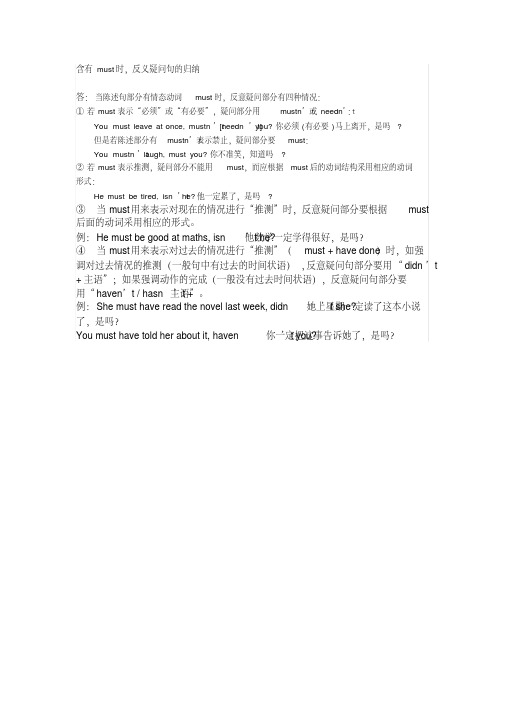
含有must时,反义疑问句的归纳
答:当陈述句部分有情态动词must时,反意疑问部分有四种情况:
:
①若must表示“必须”或“有必要”,疑问部分用mustn’t或needn’t
you?你必须(有必要)马上离开,是吗?
You must leave at once, mustn’t [needn’t]
但是若陈述部分有mustn’t表示禁止,疑问部分要must:
You mustn’t laugh, must you?你不准笑,知道吗?
②若must表示推测,疑问部分不能用must,而应根据must后的动词结构采用相应的动词
形式:
he?他一定累了,是吗?
He must be tired, isn’t
③当must用来表示对现在的情况进行“推测”时,反意疑问部分要根据must 后面的动词采用相应的形式。
他数学一定学得很好,是吗?
例:He must be good at maths, isn’t he?
④当must用来表示对过去的情况进行“推测”(must + have done)时,如强
调对过去情况的推测(一般句中有过去的时间状语),反意疑问句部分要用“didn’t + 主语”;如果强调动作的完成(一般没有过去时间状语),反意疑问句部分要
主语”。
用“haven’t / hasn’t +
她上星期一定读了这本小说例:She must have read the novel last week, didn’t she?
了,是吗?
你一定把这事告诉她了,是吗?
You must have told her about it, haven’t you?。
推测反义疑问句

(2)当must+have done表示对过去的情况进行推 测(一般句中有明确的过去时间状语),问句要 根据陈述部分谓语的情况用“didn't+主语”或 “wasn't/weren't+主语”;如果强调动作的完成 (一般没有明确的过去时间状语),问句要用 “haven't/hasn't+主语”。
She must have read the novel last week,didn't she? 她上星期一定读了这本小说,是吗?
1 带 have to 时,附加疑问用 do 或 have的相应形式 , 用 do 更常见。 You don’t have to go to school on Sundays , do you ? We have to work today , don’t we ? (haven’t we ?)2 带 must时A 表示“必须”,附加疑问部分用 mustn’t We must work hard , mustn’t we ?B 表示“有必要”时,附加疑问部分用 needn’t. The teacher must show concern for each pupil , needn’t he ?C 表示“推测”时,附加疑问部分要与陈述部分的谓语动词 相呼应。 He must be a teacher, isn’t he ? D must + have + done 是对过去情况的推测,当陈述部分没有明确的表示过去 的时间状语时,附加疑问要用have的相应形式;当陈述部分有 明确的过去时间状语时,附加疑问要用过去时。 You must have lived here for a long time , haven’t you ? You must have seen him yesterday , didn’t you ?E 当陈述部分是 must not , 表示“一定不要” 、“禁止”时,附加疑问除用must 外, 还可以用may. I must not tell him , must I ? ( may I ?)3 带 used to 时,附加疑问用 usedn’t 或didn’t . 但口语中倾向于后 者。 There used to be an apple tree in the garden , didn’t there ? (usedn’t there ? )4 带need 时,附加疑问用 do 或 need ,应该与陈述部分 need 用法相呼应。 I needn’t tell you the answer , need I ? You need to buy a better dictionary , don’t you ?5 带ought to 时,附加疑问用ought. , 但在美国英语 中用should We ought to help each other , oughtn’t we ? / shouldn’t we ?
must-have-done-的反意疑问句答疑
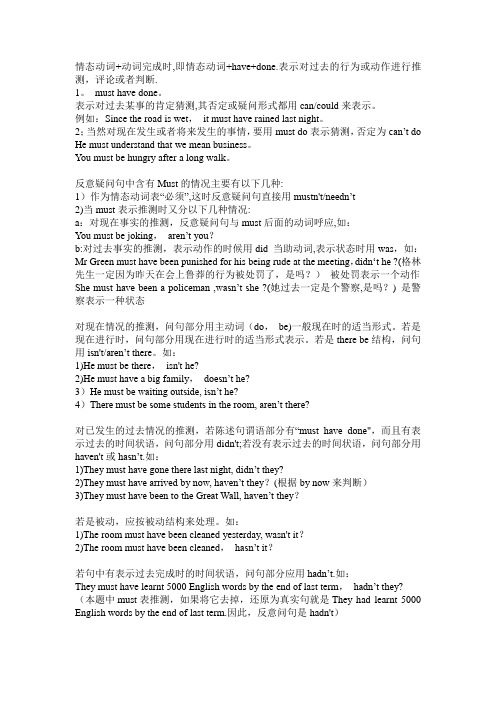
情态动词+动词完成时,即情态动词+have+done.表示对过去的行为或动作进行推测,评论或者判断.1。
must have done。
表示对过去某事的肯定猜测,其否定或疑问形式都用can/could来表示。
例如:Since the road is wet,it must have rained last night。
2;当然对现在发生或者将来发生的事情,要用must do表示猜测,否定为can’t do He must understand that we mean business。
You must be hungry after a long walk。
反意疑问句中含有Must的情况主要有以下几种:1)作为情态动词表“必须”,这时反意疑问句直接用mustn't/needn’t2)当must表示推测时又分以下几种情况:a:对现在事实的推测,反意疑问句与must后面的动词呼应,如:You must be joking,aren’t you?b:对过去事实的推测,表示动作的时候用did 当助动词,表示状态时用was,如:Mr Green must have been punished for his being rude at the meeting,didn‘t he ?(格林先生一定因为昨天在会上鲁莽的行为被处罚了,是吗?)被处罚表示一个动作She must have been a policeman ,wasn’t she ?(她过去一定是个警察,是吗?) 是警察表示一种状态对现在情况的推测,问句部分用主动词(do,be)一般现在时的适当形式。
若是现在进行时,问句部分用现在进行时的适当形式表示。
若是there be结构,问句用isn't/aren’t there。
如:1)He must be there,isn't he?2)He must have a big family,doesn’t he?3)He must be waiting outside, isn’t he?4)There must be some students in the room, aren’t there?对已发生的过去情况的推测,若陈述句谓语部分有“must have done",而且有表示过去的时间状语,问句部分用didn't;若没有表示过去的时间状语,问句部分用haven't或hasn’t.如:1)They must have gone there last night, didn’t they?2)They must have arrived by now, haven’t they?(根据by now来判断)3)They must have been to the Great Wall, haven’t they?若是被动,应按被动结构来处理。
must,may,can的反义疑问句教学内容
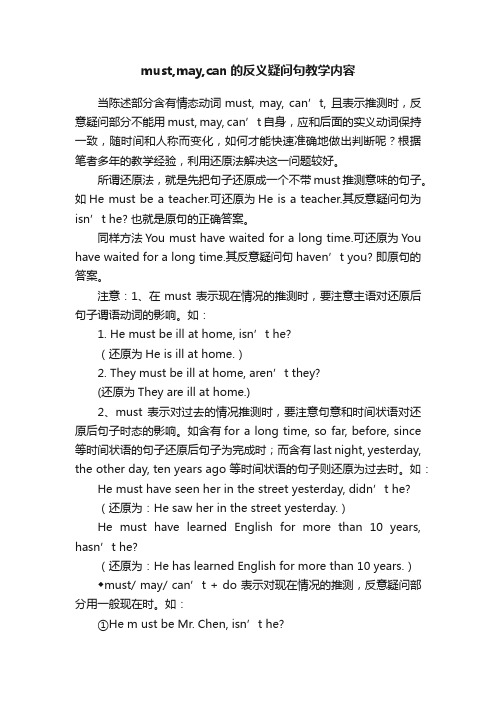
must,may,can的反义疑问句教学内容当陈述部分含有情态动词must, may, can’t, 且表示推测时,反意疑问部分不能用must, may, can’t自身,应和后面的实义动词保持一致,随时间和人称而变化,如何才能快速准确地做出判断呢?根据笔者多年的教学经验,利用还原法解决这一问题较好。
所谓还原法,就是先把句子还原成一个不带must推测意味的句子。
如He must be a teacher.可还原为He is a teacher.其反意疑问句为isn’t he? 也就是原句的正确答案。
同样方法You must have waited for a long time.可还原为You have waited for a long time.其反意疑问句haven’t you? 即原句的答案。
注意:1、在must 表示现在情况的推测时,要注意主语对还原后句子谓语动词的影响。
如:1. He must be ill at home, isn’t he?(还原为He is ill at home.)2. They must be ill at home, aren’t they?(还原为They are ill at home.)2、must 表示对过去的情况推测时,要注意句意和时间状语对还原后句子时态的影响。
如含有for a long time, so far, before, since 等时间状语的句子还原后句子为完成时;而含有last night, yesterday, the other day, ten years ago 等时间状语的句子则还原为过去时。
如:He must have seen her in the street yesterday, didn’t he?(还原为:He saw her in the street yesterday.)He must have learned English for more than 10 years, hasn’t he?(还原为:He has learned English for more than 10 years.)◆must/ may/ can’t + do 表示对现在情况的推测,反意疑问部分用一般现在时。
must的反义疑问句

Ⅰ. 1.accent 2. blocks 3. eastern 4. recognize / recognise 5. lightning Ⅱ. African 2. northwestern 3. Spanish 4. expression Ⅲ. 1.Believe it or not 2. there is no such word as ‘‘failure” 3. This is because 4.from all over the world Ⅳ.1. He played a part in the film. 2. Come straight home after school.
native 形容词; 本地人, 本国人 1. is native to India 2. Are you a native base 以….为根据; 名词;基础 1. The film is based on / upon a true story. 2. The country has a good scientific research base. because of 名词; 代词 because ; because of to ;被提出
• 对已发生的过去情况的推测,若陈述句谓语部分 有“must have done”,而且有表示过去的时间状 语,问句部分用didn‘t;若没有表示过去的时间状 语,问句部分用haven’t或hasn‘t。如: • 1)They must have gone there last night, didn't they? • 2)They must have arrived by now, haven‘t they? (根据by now来判断) • 3)They must have been to the Great Wall, haven't they?
含有must的反义疑问句
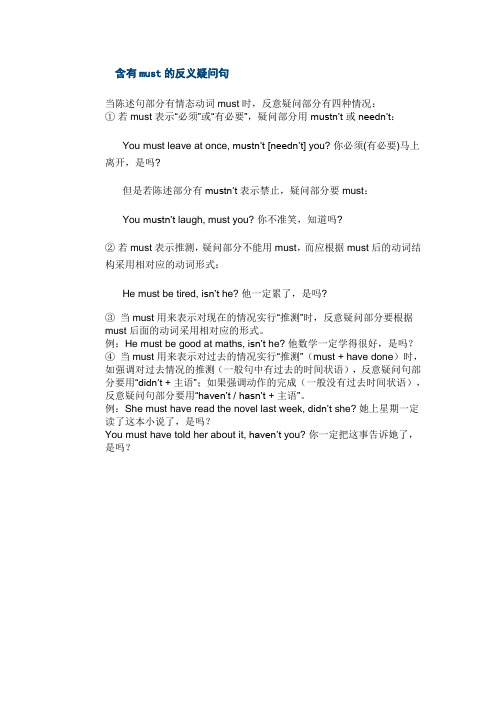
含有must的反义疑问句
当陈述句部分有情态动词must时,反意疑问部分有四种情况:
①若must表示“必须”或“有必要”,疑问部分用mustn’t或needn’t:
You must leave at once, mustn’t[needn’t] you? 你必须(有必要)马上离开,是吗?
但是若陈述部分有mustn’t表示禁止,疑问部分要must:
You mustn’t laugh, must you? 你不准笑,知道吗?
②若must表示推测,疑问部分不能用must,而应根据must后的动词结构采用相对应的动词形式:
He must be tired, isn’t he? 他一定累了,是吗?
③当must用来表示对现在的情况实行“推测”时,反意疑问部分要根据must后面的动词采用相对应的形式。
例:He must be good at maths, isn’t he? 他数学一定学得很好,是吗?
④当must用来表示对过去的情况实行“推测”(must + have done)时,如强调对过去情况的推测(一般句中有过去的时间状语),反意疑问句部分要用“didn’t + 主语”;如果强调动作的完成(一般没有过去时间状语),反意疑问句部分要用“haven’t / hasn’t + 主语”。
例:She must have read the novel last week, didn’t she? 她上星期一定读了这本小说了,是吗?
You must have told her about it, haven’t you? 你一定把这事告诉她了,是吗?。
Must在反意疑问句中的用法
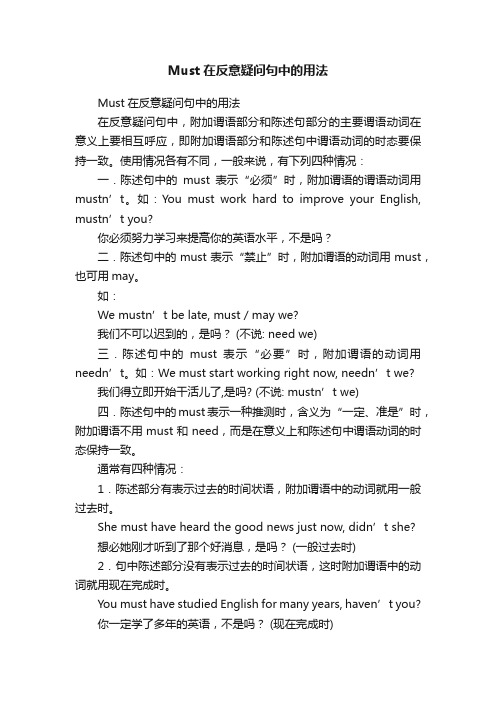
Must在反意疑问句中的用法Must在反意疑问句中的用法在反意疑问句中,附加谓语部分和陈述句部分的主要谓语动词在意义上要相互呼应,即附加谓语部分和陈述句中谓语动词的时态要保持一致。
使用情况各有不同,一般来说,有下列四种情况:一.陈述句中的must表示“必须”时,附加谓语的谓语动词用mustn’t。
如:You must work hard to improve your English, mustn’t you?你必须努力学习来提高你的英语水平,不是吗?二.陈述句中的must表示“禁止”时,附加谓语的动词用must,也可用may。
如:We mustn’t be late, must / may we?我们不可以迟到的,是吗? (不说: need we)三.陈述句中的must表示“必要”时,附加谓语的动词用needn’t。
如:We must start working right now, needn’t we?我们得立即开始干活儿了,是吗? (不说: mustn’t we)四.陈述句中的must表示一种推测时,含义为“一定、准是”时,附加谓语不用must和need,而是在意义上和陈述句中谓语动词的时态保持一致。
通常有四种情况:1.陈述部分有表示过去的时间状语,附加谓语中的动词就用一般过去时。
She must have heard the good news just now, didn’t she?想必她刚才听到了那个好消息,是吗? (一般过去时)2.句中陈述部分没有表示过去的时间状语,这时附加谓语中的动词就用现在完成时。
You must have studied English for many years, haven’t you?你一定学了多年的英语,不是吗? (现在完成时)3.陈述部分的动词表示经常性的动作或状态,附加谓语部分的动词就用一般现在时。
He must be from the south, isn’t he?他一定是南方人,对吗? (一般现在时)4.陈述句部分的谓语动词为现在进行时,也需要时态上的呼应。
反意疑问句must
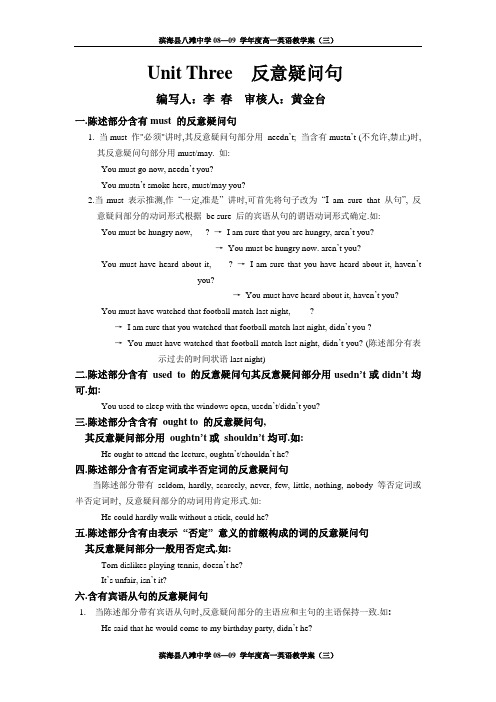
Unit Three 反意疑问句编写人:李春审核人:黄金台一.陈述部分含有must 的反意疑问句1. 当must 作"必须"讲时,其反意疑问句部分用needn’t; 当含有mustn’t (不允许,禁止)时,其反意疑问句部分用must/may. 如:You must go now, needn’t you?You mustn’t smoke here, must/may you?2.当must 表示推测,作“一定,准是”讲时,可首先将句子改为“I am sure that 从句”, 反意疑问部分的动词形式根据be sure 后的宾语从句的谓语动词形式确定.如:You must be hungry now,___? →I am sure that you are hungry, aren’t you?→You must be hungry now. aren’t you?You must have heard about it,____? →I am sure that you have heard about it, haven’tyou?→You must have heard about it, haven’t you?You must have watched that football match last night, ____?→I am sure that you watched that football match last night, didn’t you ?→You must have watched that football match last night, didn’t you? (陈述部分有表示过去的时间状语last night)二.陈述部分含有used to 的反意疑问句其反意疑问部分用usedn’t或didn’t均可.如:You used to sleep with the windows open, usedn’t/didn’t you?三.陈述部分含含有ought to 的反意疑问句,其反意疑问部分用oughtn’t或should n’t均可.如:He ought to attend the lecture, oughtn’t/shouldn’t he?四.陈述部分含有否定词或半否定词的反意疑问句当陈述部分带有seldom, hardly, scarcely, never, few, little, nothing, nobody 等否定词或半否定词时, 反意疑问部分的动词用肯定形式.如:He could hardly walk without a stick, could he?五.陈述部分含有由表示“否定”意义的前缀构成的词的反意疑问句其反意疑问部分一般用否定式.如:Tom dislikes playing tennis, doesn’t he?It’s unfair, isn’t it?六.含有宾语从句的反意疑问句1. 当陈述部分带有宾语从句时,反意疑问部分的主语应和主句的主语保持一致.如:He said that he would come to my birthday party, didn’t he?2. 但是当主句是I think, I believe, I suppose, I expect, I imagine 等结构时,反意疑问部分的主语和谓语动词均应和宾语从句的主语和谓语保持一致. 如:I don’t believe he will succeed, will he?He doesn’t believe she will succeed, does he?七.祈使句的反意疑问句祈使句后加反意疑问句,不表示反意,而表示一种语气. 其结构为:否定祈使句,+ will you? 肯定祈使句,+ will you / won’t you ?Let’s … , + shall we? Let us … ,+ will/ won’t you? Let +第三人称…,+ will you?如: Open the door, will/won’t you?Let’s go out for a walk, shall we?Let us go home now, will/won’t you?八.回答反意疑问句时应遵循以下原则:1. 要么肯定到底,要么否定到底,不能出现Yes, I don’t 和No, I do 的形式.2. 不要看汉语如何翻译,只看所提到的事情是否发生. 如果发生了,用肯定回答,否则用否定回答.如:当对方问你You aren’t a teacher, are you? 或You are a teacher, aren’t you?时,你只要听懂you和teacher两个单词即可,如果你是老师,回答Yes, I am. 否则,回答No, I am not.九.反意疑问句的主语和陈述部分的主语在人称,数上保持一致的几种情况。
must的反义疑问句
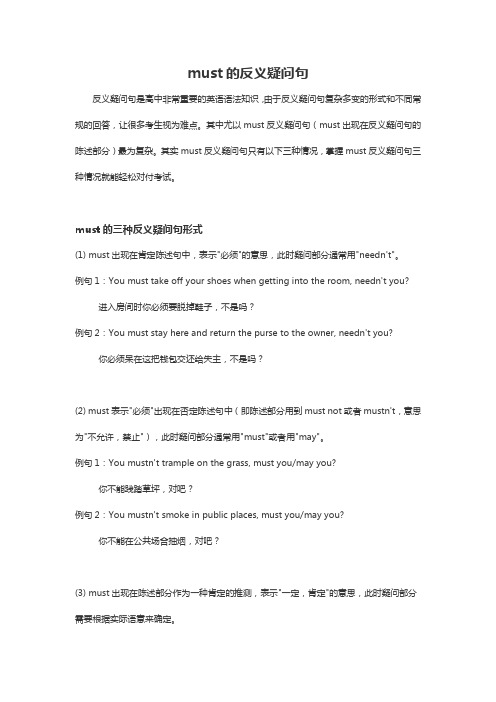
must的反义疑问句反义疑问句是高中非常重要的英语语法知识,由于反义疑问句复杂多变的形式和不同常规的回答,让很多考生视为难点。
其中尤以must反义疑问句(must出现在反义疑问句的陈述部分)最为复杂。
其实must反义疑问句只有以下三种情况,掌握must反义疑问句三种情况就能轻松对付考试。
must的三种反义疑问句形式(1) must出现在肯定陈述句中,表示"必须"的意思,此时疑问部分通常用"needn't"。
例句1:You must take off your shoes when getting into the room, needn't you?进入房间时你必须要脱掉鞋子,不是吗?例句2:You must stay here and return the purse to the owner, needn't you?你必须呆在这把钱包交还给失主,不是吗?(2) must表示"必须"出现在否定陈述句中(即陈述部分用到must not或者mustn't,意思为"不允许,禁止"),此时疑问部分通常用"must"或者用"may"。
例句1:You mustn't trample on the grass, must you/may you?你不能践踏草坪,对吧?例句2:You mustn't smoke in public places, must you/may you?你不能在公共场合抽烟,对吧?(3) must出现在陈述部分作为一种肯定的推测,表示"一定,肯定"的意思,此时疑问部分需要根据实际语意来确定。
例句1:He must be angry, isn't he?他肯定生气了,对吗?例句2:You must be hungry, aren't you?你肯定饿了,对吧?例句3:She must have got married, hasn't she?她肯定已经结婚了,对吗?注释:本句中"she must have got married"是对"she has got married"的肯定性强调,所以反义疑问句应该用"hasn't she"。
Must的反义疑问句
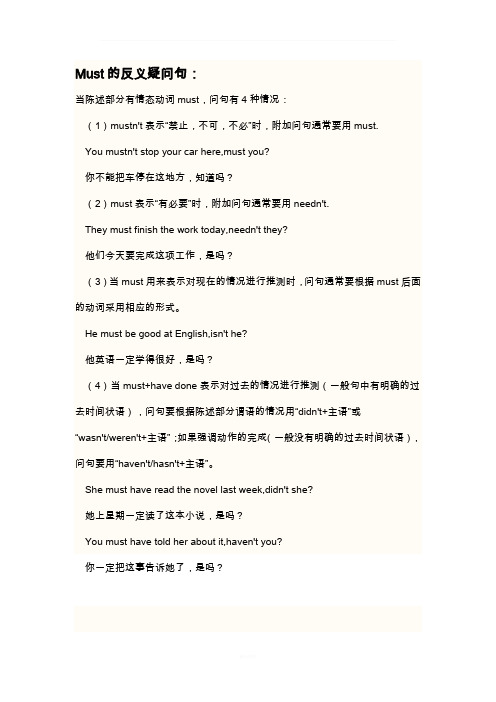
Must的反义疑问句:当陈述部分有情态动词must,问句有4种情况:(1)mustn't表示“禁止,不可,不必”时,附加问句通常要用must.You mustn't stop your car here,must you?你不能把车停在这地方,知道吗?(2)must表示“有必要”时,附加问句通常要用needn't.They must finish the work today,needn't they?他们今天要完成这项工作,是吗?(3)当must用来表示对现在的情况进行推测时,问句通常要根据must后面的动词采用相应的形式。
He must be good at English,isn't he?他英语一定学得很好,是吗?(4)当must+have done表示对过去的情况进行推测(一般句中有明确的过去时间状语),问句要根据陈述部分谓语的情况用“didn't+主语”或“wasn't/weren't+主语”;如果强调动作的完成(一般没有明确的过去时间状语),问句要用“haven't/hasn't+主语”。
She must have read the novel last week,didn't she?她上星期一定读了这本小说,是吗?You must have told her about it,haven't you?你一定把这事告诉她了,是吗?need的反义疑问句:need的用法分为两种,一种是作为情态动词,一种是作为实义动词。
一般而言,need作为情态动词是在否定句(有时为疑问句中),此种情况在反义疑问句中通常为need I或needn't I,而当这句话是一句肯定句是,这里的need就作为实义动词,通常为do you或者是don't you就比如LZ说的句子I needn’t tell you the answer , need I ?这里need为情态动词,前面否定,后用need肯定You need to buy a better dictionary , don’t you ? 这里need为实义动词,前面肯定,所以后面用do的否定形式don't说起will,我不明白LZ是什么意思,与will有关的知识点整理在这里开头为Let's,后面一定用shall +we例:Let's go,shall we开头为Let us,后面一定用will you例:Let us go,will youthink, believe, suppose, imagine, expect等动词后接宾语从句构成的主从复合句在构成反意疑问句时,视情况不同有两种不同的构成方式。
含情态动词must的反义疑问句
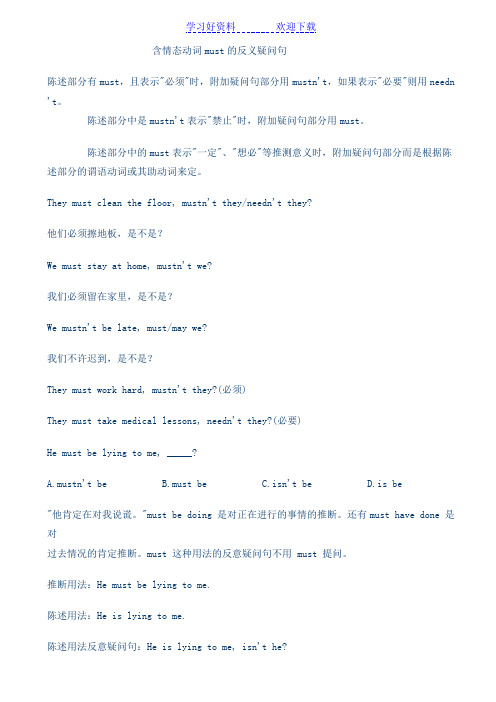
含情态动词must的反义疑问句陈述部分有must,且表示"必须"时,附加疑问句部分用mustn't,如果表示"必要"则用needn 't。
陈述部分中是mustn't表示"禁止"时,附加疑问句部分用must。
陈述部分中的must表示"一定"、"想必"等推测意义时,附加疑问句部分而是根据陈述部分的谓语动词或其助动词来定。
They must clean the floor, mustn't they/needn't they?他们必须擦地板,是不是?We must stay at home, mustn't we?我们必须留在家里,是不是?We mustn't be late, must/may we?我们不许迟到,是不是?They must work hard, mustn't they?(必须)They must take medical lessons, needn't they?(必要)He must be lying to me, _____?A.mustn't beB.must beC.isn't beD.is be"他肯定在对我说谎。
"must be doing 是对正在进行的事情的推断。
还有must have done 是对过去情况的肯定推断。
must 这种用法的反意疑问句不用 must 提问。
推断用法:He must be lying to me.陈述用法:He is lying to me.陈述用法反意疑问句:He is lying to me, isn't he?推断用法反意疑问句:He must be lying to me, isn't he?推断用法:He must have been abroad.陈述用法:He has been abroad.陈述用法反意疑问句:He has been abroad, hasn't he?推断用法反意疑问句:He must have been abroad, hasn't he?推断用法:He must have gone swimming yesterday.陈述用法:He went swimming yesterday.陈述用法反意疑问句:He went swimming yesterday, didn't he?推断用法反意疑问句:He must have gone swimming yesterday, didn't he?He must be a visitor, isn't he?(对现在情况的推测)You must have seen him at his birthday party yesterday, didn't you?(对过去情况的推测,且句中有过去的时间状语)You must have seen him at his birthday party,haven't you?(强调动作的完成)1 带have to 时,附加疑问用do 或have的相应形式, 用do 更常见。
must的三种反义疑问句
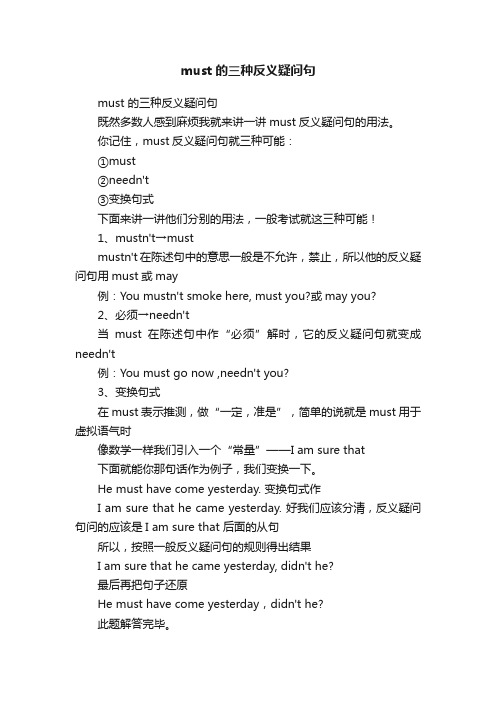
must的三种反义疑问句must 的三种反义疑问句既然多数人感到麻烦我就来讲一讲must反义疑问句的用法。
你记住,must反义疑问句就三种可能:①must②needn't③变换句式下面来讲一讲他们分别的用法,一般考试就这三种可能!1、mustn't→mustmustn't在陈述句中的意思一般是不允许,禁止,所以他的反义疑问句用must或may例:You mustn't smoke here, must you?或may you?2、必须→needn't当must在陈述句中作“必须”解时,它的反义疑问句就变成needn't例:You must go now ,needn't you?3、变换句式在must表示推测,做“一定,准是”,简单的说就是must用于虚拟语气时像数学一样我们引入一个“常量”——I am sure that下面就能你那句话作为例子,我们变换一下。
He must have come yesterday. 变换句式作I am sure that he came yesterday. 好我们应该分清,反义疑问句问的应该是I am sure that 后面的从句所以,按照一般反义疑问句的规则得出结果I am sure that he came yesterday, didn't he?最后再把句子还原He must have come yesterday,didn't he?此题解答完毕。
下面是我搜索英国和美国语料库的结果:英国语料库:Davies, Mark. (2004-) BYU-BNC: The British National Corpus. Available online at /doc/9d16170302.html,/bnc.1. I was just thinking I bet that Helen was pleased then cos she must have passed, mustn't she?2. Yes. Now it must have been mustn't it, a possibility, if been there at all, that he was hiding under that bed?3. Exactly why, he must have had some sympathy, mustn't he?.4. …she must have passed mustn't she?5. He must have been interested in cooking, mustn't he?6. Yeah well I mean he must have gone in the hospital to her mustn't he?8. You must have touched her up the wrong way. --Yeah, I must have done mustn't I?9. Now it must have been mustn't it, a possibility, if been there at all, that he was hiding under that bed?10. Exactly why, he must have had some sympathy, mustn't he?.11. He must have been interested in cooking, mustn't he?12. Yeah well I mean he must have gone in the hospital to her mustn't he?13. Yeah, I must have done mustn't I?14. Somebody must have reported him, though, mustn't they?15. Abruptly she stood up and crossed to the window. "I must have done , mustn't I?"16. You must have seen the seals, though, didn't you?17. Exactly why, he must have had some sympathy , mustn't he ?.18. And your sister's ten years older than you so they must 've been there ten years plus , mustn't they ?19. They have a serious side but they must have a lighter side as well , mustn't they ?20. It must be , mustn't it ?21. Yeah. The profit would have been minus cos the costs would still be there so it must be a cancellation . Mustn't it ?22. Yes, now this shows it must be his imagination , mustn't it ?23. …they must know there is a risk , mustn't they .24. It must mean something , mustn't it ?25. Six pairs of knickers must be enough , mustn't it , Charlie?26. Then it must be Madame V in Paris , mustn't it ?27. Everybody who sees her must love her , mustn't they , Ellen?28. But he must like her a bit , mustn't he ?29. Saturday night. Yeah? Yeah. So he must be doing well, mustn’t he?30. Yeah. Okay. So what, they mus t be staying, staying the Saturday night, mustn’t they?31. You must have seen the seals, though, didn’t you?(用didn't的只搜到这一例)美国语料库:/doc/9d16170302.html,/1. You must have enjoyed those, didn't you?2. And you must have had a name, didn't you?3. Oh Patrick, I must have told you -- didn't I?4. Must have seemed like an eternity, didn't it, holding your breath?5. Must have had three kids, did she?6. I'm sure they must be exaggerating, aren't they, Professor?7. You must have called an undertaker by now, haven't you? 还是英国语料库:推断:It must mean something , mustn't it?Everybody who sees her must love her , mustn't they, Ellen?But he must like her a bit , mustn't he?Yes, now this shows it must be his imagination , mustn't it? he must have had some sympathy , mustn't he?必须:Well they must do them Sarah , mustn't they?First I must wash , mustn't I?。
(完整版)含有must时,反义疑问句的归纳
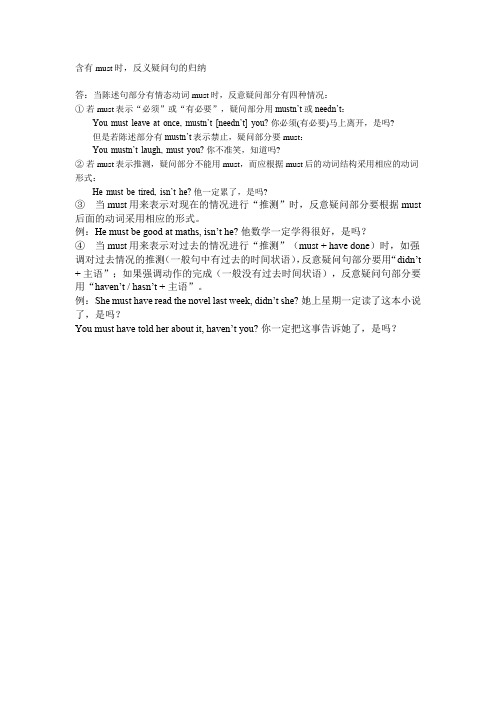
含有must时,反义疑问句的归纳
答:当陈述句部分有情态动词must时,反意疑问部分有四种情况:
①若must表示“必须”或“有必要”,疑问部分用mustn’t或needn’t:
You must leave at once, mustn’t [needn’t] you?你必须(有必要)马上离开,是吗?
但是若陈述部分有mustn’t表示禁止,疑问部分要must:
You mustn’t laugh, must you?你不准笑,知道吗?
②若must表示推测,疑问部分不能用must,而应根据must后的动词结构采用相应的动词形式:
He must be tired, isn’t he?他一定累了,是吗?
③当must用来表示对现在的情况进行“推测”时,反意疑问部分要根据must 后面的动词采用相应的形式。
例:He must be good at maths, isn’t he?他数学一定学得很好,是吗?
④当must用来表示对过去的情况进行“推测”(must + have done)时,如强调对过去情况的推测(一般句中有过去的时间状语),反意疑问句部分要用“didn’t + 主语”;如果强调动作的完成(一般没有过去时间状语),反意疑问句部分要用“haven’t / hasn’t +主语”。
例:She must have read the novel last week, didn’t she?她上星期一定读了这本小说了,是吗?
You must have told her about it, haven’t you?你一定把这事告诉她了,是吗?。
反义疑问句must的用法及回答

反义疑问句must的用法及回答解析反义疑问句是一种特殊的疑问句,它由一个陈述句和一个与之相反意义的简短疑问句构成,用来表示说话人对某事的看法或态度,或者征求对方的意见或同意。
反义疑问句中,如果陈述部分有情态动词must,那么根据must 的不同含义和语气,反意疑问部分有四种可能的形式:mustn't, needn't, didn't或haven't/hasn't。
本文将分别介绍这四种情况的用法及回答,并给出一些例句和练习。
一、must表示“必须”或“有必要”当陈述部分的must表示“必须”或“有必要”时,反意疑问部分通常用mustn't或needn't。
这两种形式都可以表示说话人对陈述部分的肯定或强调,但是mustn't更加强烈,而needn't更加委婉。
例如:You must leave at once, mustn't you? 你必须马上离开,是吗?(强调必要性)You must leave at once, needn't you? 你必须马上离开,是吗?(询问是否必要)回答这种反义疑问句时,如果同意陈述部分,可以用Yes, I must. 或Yes, I do.;如果不同意陈述部分,可以用No, I needn't. 或No, I don't have to.。
例如:You must leave at once, mustn't you? 你必须马上离开,是吗?Yes, I must. 是的,我必须。
No, I needn't. 不,我不必。
No, I don't have to. 不,我不用。
二、must表示“推测”当陈述部分的must表示“推测”时,反意疑问部分不能用must,而应根据must后面的动词结构采用相应的动词形式。
例如:He must be tired, isn't he? 他一定累了,是吗?(根据be动词用isn't)They must have arrived by now, haven't they? 他们现在一定已经到了,是吗?(根据have done结构用haven't)回答这种反义疑问句时,如果同意陈述部分,可以用Yes, he is. 或Yes, they have.;如果不同意陈述部分,可以用No, he isn't. 或No, they haven't.。
“must”表推测的反意疑问句最佳掌握法

“must”表推测的反意疑问句最佳掌握法适用于高二或高三各期“must”表推测的反意疑问句是高考考点之一,一般资料把它概括为三种情形:对当前状况的推测,对过去情况的推测和对现在完成情况的推测。
学生对后两种情况往往难以界定。
现介绍一种最简洁并确保万无一失的方法,即先将该句变成表达事实的句子,再形成反意疑问,便可得出正确形式。
请看以下各例:1. She must be in the office.事实:She is in the office.反意疑问: isn’t she?2. He must go by bus.事实:He goes by bus.反意疑问: doesn’t he?3. You must have seen the film last week.事实:You saw the film last week.反意疑问: don’t you?4. They must have been here yesterday.They were here yesterday.反意疑问: weren’t they?5. He must have waited here for a long time.事实:He has waited here for a long time.反意疑问: hasn’t he?6. You must have been to the USA.You have been to the USA.反意疑问: haven’t you?是不是很简单?检测一下吧。
1. Look, the road is wet. It must have rained last night, ________?2. You must be a teacher, _______?3. They must have finished the work, __________?4. Why isn’t he here? He must have missed the train, ________?5. Her eyes are red. She must have cried, _________?Keys: 1. didn’t it 2. aren’t you 3. haven’t they 4. didn’t he 5. didn’t sheName: 王俊Address: 重庆市江津聚奎中学Tel: (023)47329354E-mail:*****************。
must引导的反义疑问句
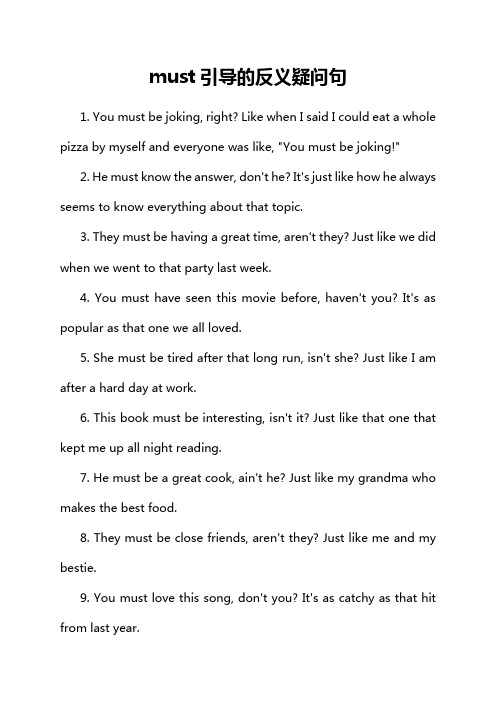
must引导的反义疑问句1. You must be joking, right? Like when I said I could eat a whole pizza by myself and everyone was like, "You must be joking!"2. He must know the answer, don't he? It's just like how he always seems to know everything about that topic.3. They must be having a great time, aren't they? Just like we did when we went to that party last week.4. You must have seen this movie before, haven't you? It's as popular as that one we all loved.5. She must be tired after that long run, isn't she? Just like I am after a hard day at work.6. This book must be interesting, isn't it? Just like that one that kept me up all night reading.7. He must be a great cook, ain't he? Just like my grandma who makes the best food.8. They must be close friends, aren't they? Just like me and my bestie.9. You must love this song, don't you? It's as catchy as that hit from last year.10. She must be excited about the trip, isn't she? Just like I was when I was going on vacation.My conclusion is that using "must" in a question can make the conversation more engaging and interesting, and it's a great way to get people's opinions and reactions.。
must在反义疑问句中的用法
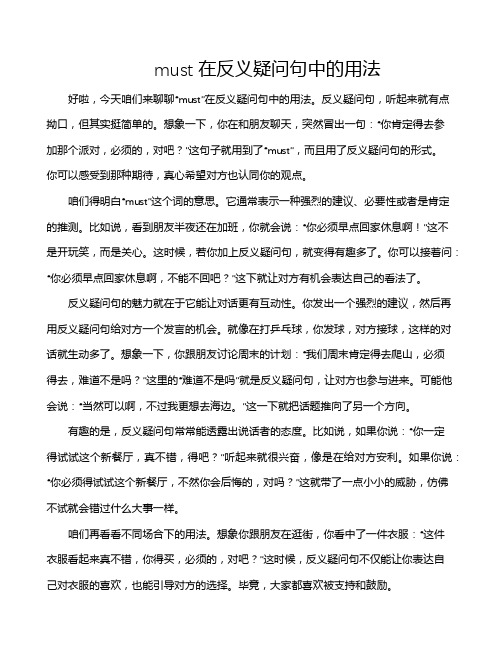
must在反义疑问句中的用法好啦,今天咱们来聊聊“must”在反义疑问句中的用法。
反义疑问句,听起来就有点拗口,但其实挺简单的。
想象一下,你在和朋友聊天,突然冒出一句:“你肯定得去参加那个派对,必须的,对吧?”这句子就用到了“must”,而且用了反义疑问句的形式。
你可以感受到那种期待,真心希望对方也认同你的观点。
咱们得明白“must”这个词的意思。
它通常表示一种强烈的建议、必要性或者是肯定的推测。
比如说,看到朋友半夜还在加班,你就会说:“你必须早点回家休息啊!”这不是开玩笑,而是关心。
这时候,若你加上反义疑问句,就变得有趣多了。
你可以接着问:“你必须早点回家休息啊,不能不回吧?”这下就让对方有机会表达自己的看法了。
反义疑问句的魅力就在于它能让对话更有互动性。
你发出一个强烈的建议,然后再用反义疑问句给对方一个发言的机会。
就像在打乒乓球,你发球,对方接球,这样的对话就生动多了。
想象一下,你跟朋友讨论周末的计划:“我们周末肯定得去爬山,必须得去,难道不是吗?”这里的“难道不是吗”就是反义疑问句,让对方也参与进来。
可能他会说:“当然可以啊,不过我更想去海边。
”这一下就把话题推向了另一个方向。
有趣的是,反义疑问句常常能透露出说话者的态度。
比如说,如果你说:“你一定得试试这个新餐厅,真不错,得吧?”听起来就很兴奋,像是在给对方安利。
如果你说:“你必须得试试这个新餐厅,不然你会后悔的,对吗?”这就带了一点小小的威胁,仿佛不试就会错过什么大事一样。
咱们再看看不同场合下的用法。
想象你跟朋友在逛街,你看中了一件衣服:“这件衣服看起来真不错,你得买,必须的,对吧?”这时候,反义疑问句不仅能让你表达自己对衣服的喜欢,也能引导对方的选择。
毕竟,大家都喜欢被支持和鼓励。
反义疑问句还能带出一种玩笑的语气。
比如,你和朋友一起看电影,看到一个老掉牙的剧情,你就可以说:“这个剧情真是烂透了,肯定得让人笑死,不是吗?”这时候,你的语气是轻松的,带着调侃的意味,显得亲切又幽默。
- 1、下载文档前请自行甄别文档内容的完整性,平台不提供额外的编辑、内容补充、找答案等附加服务。
- 2、"仅部分预览"的文档,不可在线预览部分如存在完整性等问题,可反馈申请退款(可完整预览的文档不适用该条件!)。
- 3、如文档侵犯您的权益,请联系客服反馈,我们会尽快为您处理(人工客服工作时间:9:00-18:30)。
must 的三种反义疑问句
既然多数人感到麻烦我就来讲一讲must反义疑问句的用法。
你记住,must反义疑问句就三种可能:
①must
②needn't
③变换句式
下面来讲一讲他们分别的用法,一般考试就这三种可能!
1、mustn't→must
mustn't在陈述句中的意思一般是不允许,禁止,所以他的反义疑问句用must或may
例:You mustn't smoke here, must you?或may you?
2、必须→needn't
当must在陈述句中作“必须”解时,它的反义疑问句就变成needn't
例:You must go now ,needn't you?
3、变换句式
在must表示推测,做“一定,准是”,简单的说就是must用于虚拟语气时
像数学一样我们引入一个“常量”——I am sure that
下面就能你那句话作为例子,我们变换一下。
He must have come yesterday. 变换句式作
I am sure that he came yesterday. 好我们应该分清,反义疑问句问的应该是I am sure that 后面的从句
所以,按照一般反义疑问句的规则得出结果
I am sure that he came yesterday, didn't he?
最后再把句子还原
He must have come yesterday,didn't he?
此题解答完毕。
下面是我搜索英国和美国语料库的结果:
英国语料库:Davies, Mark. (2004-) BYU-BNC: The British National Corpus. Available online at /bnc.
1. I was just thinking I bet that Helen was pleased then cos she must have passed, mustn't she?
2. Yes. Now it must have been mustn't it, a possibility, if been there at all, that he was hiding under that bed?
3. Exactly why, he must have had some sympathy, mustn't he?.
4. …she must have passed mustn't she?
5. He must have been interested in cooking, mustn't he?
6. Yeah well I mean he must have gone in the hospital to her mustn't he?
8. You must have touched her up the wrong way. --Yeah, I must have done mustn't I?
9. Now it must have been mustn't it, a possibility, if been there at all, that he was hiding under that bed?
10. Exactly why, he must have had some sympathy, mustn't he?.
11. He must have been interested in cooking, mustn't he?
12. Yeah well I mean he must have gone in the hospital to her mustn't he?
13. Yeah, I must have done mustn't I?
14. Somebody must have reported him, though, mustn't they?
15. Abruptly she stood up and crossed to the window. "I must have done , mustn't I?"
16. You must have seen the seals, though, didn't you?
17. Exactly why, he must have had some sympathy , mustn't he ?.
18. And your sister's ten years older than you so they must 've been there ten years plus , mustn't they ?
19. They have a serious side but they must have a lighter side as well , mustn't they ?
20. It must be , mustn't it ?
21. Yeah. The profit would have been minus cos the costs would still be there so it must be a cancellation . Mustn't
it ?
22. Yes, now this shows it must be his imagination , mustn't it ?
23. …they must know there is a risk , mustn't they .
24. It must mean something , mustn't it ?
25. Six pairs of knickers must be enough , mustn't it , Charlie?
26. Then it must be Madame V in Paris , mustn't it ?
27. Everybody who sees her must love her , mustn't they , Ellen?
28. But he must like her a bit , mustn't he ?
29. Saturday night. Yeah? Yeah. So he must be doing well, mustn’t he?
30. Yeah. Okay. So what, they mus t be staying, staying the Saturday night, mustn’t they?
31. You must have seen the seals, though, didn’t you?(用didn't的只搜到这一例)
美国语料库:/
1. You must have enjoyed those, didn't you?
2. And you must have had a name, didn't you?
3. Oh Patrick, I must have told you -- didn't I?
4. Must have seemed like an eternity, didn't it, holding your breath?
5. Must have had three kids, did she?
6. I'm sure they must be exaggerating, aren't they, Professor?
7. You must have called an undertaker by now, haven't you?
还是英国语料库:
推断:
It must mean something , mustn't it?
Everybody who sees her must love her , mustn't they, Ellen?
But he must like her a bit , mustn't he?
Yes, now this shows it must be his imagination , mustn't it?
he must have had some sympathy , mustn't he?
必须:
Well they must do them Sarah , mustn't they?
First I must wash , mustn't I?。
